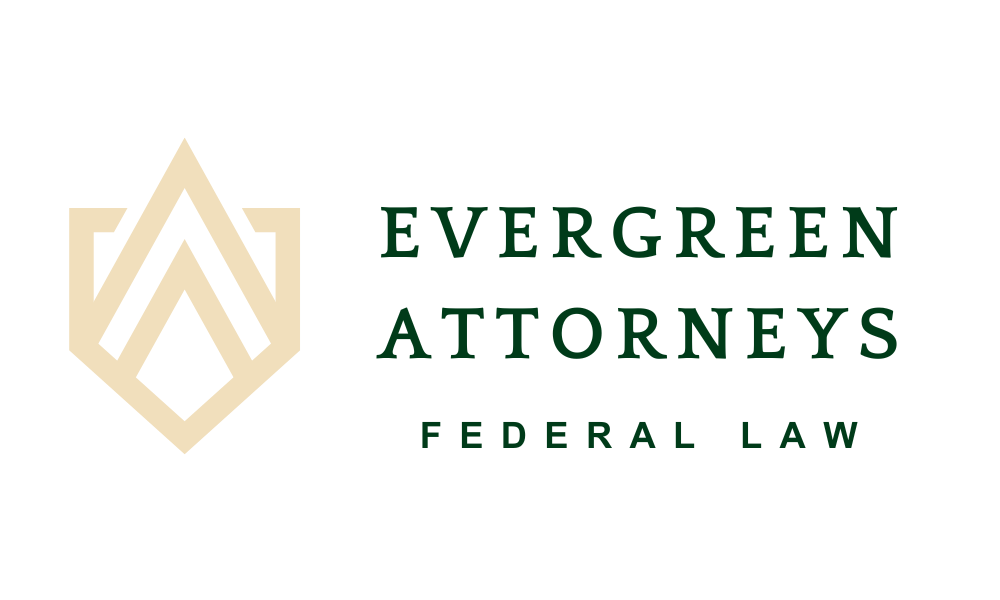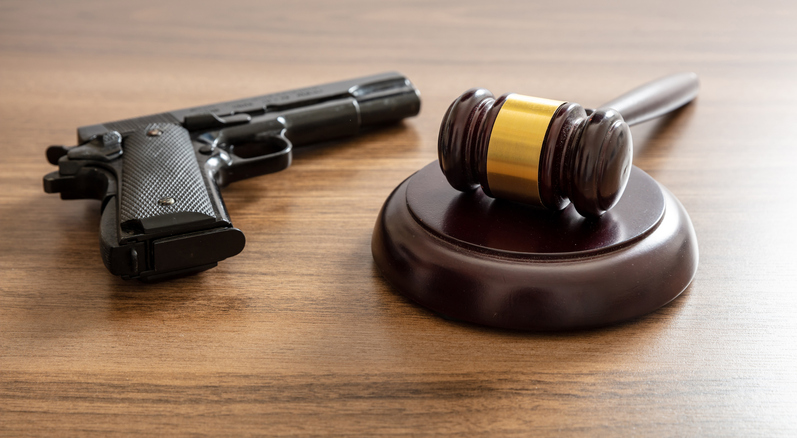Share
Share
White Collar Corner -November 3, 2025
The federal white collar crime lawyers at Evergreen Attorneys are committed to providing the highest level of federal criminal defense to our clients across the country. As part of our dedication to being the top white collar crime attorneys in Colorado and nationwide, we publish a regularly occurring series known as the White Collar Corner.
In this bi-weekly (monthly?) series of blog posts, the lawyers at Evergreen Attorneys will break down new developments in federal white collar crime law, BOP news, and other items of interest for federal criminal law practitioners. We may cover recent case law developments, changes in the federal prison system, or simply other substantive issues that need to make it out of the lawyer group chat and out to the general public.
If you or someone you know needs help with the federal criminal justice system, do not hesitate to contact the lawyers at Evergreen Attorneys. We can be reached at (303) 948-1489 or by email at [email protected]. Want to talk to Zachary Newland directly? Email him at [email protected]
About Us: Federal White Collar Lawyers at Evergreen Attorneys
Federal Healthcare Fraud Indictment
United States v. Mattia, No. 24-2589, 2025 WL 2962563 (3d Cir. Oct. 21, 2025)
Carmine Mattia was charged with having defrauded a pharmacy benefits management company (commonly called a PBM) by causing the submission of fraudulent claims for medically unnecessary medicines. According to the Government, Mattia induced a person to seek out the unnecessary compounded medicines and secured, or caused to be secured, a doctor’s signature on the RX for the medicines without properly determining if the compounded prescriptions were medically necessary.
Mattia moved to dismiss the indictment. Mattia argued that the indictment failed to adequately even argue any alleged misrepresentations or omissions that violated federal healthcare law pursuant to 18 U.S.C. Section 1347. Surprisingly, the district court agreed with Mattia and dismissed the indictment.
On appeal the Third Circuit reversed. The Third Circuit pointed out that dismissal of an indictment is an extraordinary remedy and will only be granted when there are no set of facts which as alleged in an indictment constitute the alleged crime.
More importantly for federal healthcare fraud defense lawyers, the Third Circuit went out of its way to address the so-called “implicit fraudulent misrepresentation” theory of healthcare fraud. The Third Circuit joined the Fifth Circuit and the Eleventh Circuit as approving of the use of the implicit fraudulent misrepresentation theory of federal healthcare fraud under 18 U.S.C. Section 1347. See United States v. Anderson, 980 F.3d 423, 429 (5th Cir. 2020) and United States v. Gonzalez, 834 F.3d 1206, 1214 (11th Cir. 2016).
This case is important because it represents yet another expansion of the federal criminal healthcare fraud liability to people not personally involved in providing medical care. Mr. Mattia worked for a telehealth company. He had no role or involvement with the doctor writing the prescriptions at issue. He had not authority to personally fill the supposedly unnecessary compound prescriptions. But, according to the Government, Mr. Mattia is just as liable as anyone else. Hopefully he will prevail at trial against the continued over-criminalization of the practice of medicine.
Federal Wire Fraud Requires Showing Interstate Commerce
United States v. Baker, No. 23-4099, 2025 WL 2950489 (10th Cir. Oct. 20, 2025)
By all accounts, Matthew Baker, seems like a not great guy. He essentially tried to screw over his own brother and some financial institutions. Matthew owed his brother $445,000. After selling some real estate that earned him more than enough to cover the $445,000, Matthew tried to cut his brother out and keep all the funds. He first called the escrow agent for the real estate deal and lied about how the money should be split. Matthew also went on the internet and falsified documents maintained by the state corporation authorities to make it look like he was the owner of the business where the proceeds were supposed to be sent to.
Matthew’s not-so-good deeds resulted in a jury conviction on two-counts of federal wire fraud. Count One alleged a federal criminal wire fraud based on the telephone call to the escrow agent. Count Two alleged federal criminal wire fraud based on the alteration, using the internet, of the Utah Corporation Commission records.
On appeal, Maththew argued that the government did not put any evidence in front of the juryt to prove that the wire-transmission underlying Count Two (the fake documents) traveled in interstate commerce. To prove a federal wire fraud violation of 18 U.S.C. Section 1343 the federal government must show that the acts occurred in interstate commerce. The Tenth Circuit has long held that this means the government must prove that the charged communications actually crossed state lines. United States v. Kieffer, 681 F.3d 1143, 1153 (10th Cir. 2012).
In the vast majority of cases, this element is easy to prove. In fact, bad attorneys who are not experienced in federal criminal wire fraud cases often stipulate that the communications actually crossed state lines.
However, the Tenth Circuit has also held that an individual’s use of the internet without more does not establish an interstate transmission (i.e., that it actually crossed state lines). Kieffer, 681 F.3d at 1155. In Matthew’s case, the only evidence was that 1) Matthew used the internet while located in Utah 2) title company employees in Utah looked at the website twice and 3) that the Utah business-entity website is publicly available to anyone on the internet.
According to the Tenth Circuit, this was not enough to establish an interstate transmission. The Tenth Circuit held that the conviction was clear and obvious error and reversed. Matthew Baker’s case stands for the almost universal maxim: do not stipulate away anything that the government would otherwise be required to prove at trial.
BOP Competency Evaluation Used At Sentencing
United States v. Davis, No. 24-1099, 2025 WL 2950507 (9th Cir. Oct. 20, 2025)
Davis pled guilty to making a false statement during a firearms transaction in violation of 18 U.S.C. Section 922(a)(6), making a false statement in a passport application in violation of 18 U.S.C. Section 1542 and aggravated identity theft in violation of 18 U.S.C. Section 1028(a)(1). After pleading guilty, Davis asked the district court to order a psychological evaluation to determine his mental competency before sentencing.
For some reason, he also requested that the evaluation be filed with the court. Unsurprisingly, the report was filed with the court and include a great deal of unfavorable information inside it. Davis then tried to object and keep the information out of court and have it not be used at sentencing. According to Davis, the use of the information would violate the 5th Amendment right against self-incrimination.
The Ninth Circuit held that Davis “should not have been surprised” that the district court would consider the report at sentencing. Reciting a long line of cases, the Ninth Circuit pointed out that the sentencing court has discretion to consider a “largely unlimited” scope of reliable information. See United States v. Tucker, 404 U.S. 443, 446, 92 S.Ct. 589, 30 L.Ed.2d 592 (1972)
What are the takeaways from Davis? First, experienced federal criminal defense lawyers know that you never ever use a BOP evaluator for competency. Those doctors work for the prison.
Second, you need to get a competency evaluation performed prior to accepting or rejecting any plea deal. Not in advance of sentencing. Third, never agree that the report should be filed with the court if you can avoid it.
Federal Obstruction Enhancement Requires More Proof (sometimes)
United States v. Onah, No. 24-2804, 2025 WL 2978876 (2d Cir. Oct. 21, 2025)
Onah went to trial and was convicted. At sentencing, the district court imposed a 2-level guideline enhancement for obstruction of justice based on Onah’s own testimony at trial. Onah appealed.
Where the obstruction enhancement is based solely on a defendant’s perjury at trial, the district court must make specific findings to support perjury. Thus, a sentencing court must find that the defendant 1) willfully 2) and materially 3) committed perjury, which is (a) the intentional (b) giving of false testimony (c) as to a material matter. United States v. Thompson, 808 F.3d 190, 194–95 (2d Cir. 2015)
This is a much higher standard than is normally required to support guideline enhancements. It is actually an outlier among modern Sentencing Guideline jurisprudence. We are pointing out this issue so that attorneys who may not be as experienced in federal criminal defense continue to be aware.
Being close to others suspected of criminal activity is not enough to search
United States v. Huerta, No. 25-1050, 2025 WL 3018105 (10th Cir. Oct. 29, 2025)
In a long and torturous opinion, the Tenth Circuit arrives at the right conclusion. Merely being nearby other people who are themselves suspected of criminal activity does not create reasonable suspicion for the police to stop and search you. Or frisk you. Or otherwise detain you.
That is the definition of a “mere hunch” and the Fourth Amendment requires more to support a valid search or seizure of your person.
Federal Double Jeopardy Prohibited Retrial
United States v. Cole, No. 23-7566-CR, 2025 WL 2999484 (2d Cir. Oct. 27, 2025)
Most people think that the Double Jeopardy Clause of the Constitution means you cannot be tried twice. The complicated reality is that it means you can sometimes be tried twice, sometimes its a maybe, and other times you cannot be tried twice. What do federal white collar crime lawyers need to know about the Double Jeopardy Clause? Issue Preclusion.
In short, the issue preclusion function of the Double Jeopardy Clause prohibits the government from “relitigating any issue that was necessarily decided by a jury’s acquittal in a prior trial.” Yeager v. United States, 557 U.S. 110, 116, 119, 129 S.Ct. 2360, 174 L.Ed.2d 78 (2009). The point of this issue preclusion prohibition is to 1) preserve the finality of the first jury’s not-guilty verdict and 2) protect citizens from facing repeated trials for the same conduct until the government gets an outcome it likes (i.e., guilty).
Cole’s case was based on improper givebacks and incentives. The government charged Cole with two types of crimes: 1) conspiracy to commit securities fraud and 2) substantive securities fraud for those same acts. This is common in federal white collar crime cases.
In 2021, Cole went to trial. The jury acquitted Cole on the conspiracy charges but was unable to reach a unanimous verdict as to any of the substantive charges. The jury deadlocked on those. The government was certainly unhappy and they decided to retry Cole on the substantive counts one year later.
At the second trial, the jury heard much of the same evidence and convicted Cole on the substantive counts. Cole appealed and argued that the jury “necessarily decided” an issue in the defendant’s favor when it acquitted him at the first trial, and so the government should be issue precluded from relitigating the issue.
The Second Circuit ultimately agreed with Cole. Cole’s convictions were reversed on Double Jeopardy grounds. Cole had the benefit of excellent federal white collar crime attorneys arguing his appeal and the outcome spoke volumes about their successful advocacy.
Vindictive Prosecution Right to Discovery
United States v. Abrego, No. 3:25-CR-00115, 2025 WL 3002840 (M.D. Tenn. Oct. 27, 2025)
Many federal criminal defense clients feel that they are being unfairly singled out. In fact, most white collar crime defendants know that the federal government cannot prosecute all potential white collar cases so they choose examples they want to make. Thus, clients often want to seek dismissal of charges based on vindictive or unlawful motives of prosecution.
In federal criminal cases, it is often difficult to obtain discovery or information to support our client’s vindictive prosecution claims. However, in the recent Abrego case, one district court judge allowed this discovery. In Abrego, the district court also overruled a claim of Executive Privilege to allow the defense to seek the production of internal government documents:
“The motivations of the people who place the file on the prosecutor’s desk are highly relevant when considering a motion to dismiss for vindictive prosecution.”United States v. Abrego, No. 3:25-CR-00115, 2025 WL 3002840, at *1 (M.D. Tenn. Oct. 27, 2025)
SCOTUS to Address Compassionate Release
On November 12, 2025, the U.S. Supreme Court will hear arguments in a pair of cases that raise important issues about federal criminal defense. Our founding attorney, Zachary Newland, has written a preview article for Law360 as part of their Expert Analysis series. We will publish that article on our page for our readers in the coming days.
Contact the Federal White Collar Lawyers at Evergreen Attorneys
Federal criminal defense is a special beast. Most lawyers are not equipped or ready to help you with you federal white collar crime defense. You need a dedicated team that solely focuses on defending complex federal criminal defense cases. You need Evergreen Attorneys.
If you are in need of experienced federal criminal defense attorneys to assist you with your case, contact us today. You can call us at (303) 948-1489 or email to [email protected] or by emailing Zachary Newland directly at [email protected] today.
Zachary Newland
Zachary Newland is an attorney, author, aspiring BBQ connoisseur, and mediocre skier. Zachary's law practice is focused on federal criminal defense, federal appellate advocacy including post-conviction remedies, civil rights litigation, and complex trial work. Zach lives in Evergreen, Colorado with his family. You can reach Zach at [email protected] to discuss your case or call him directly at 303-948-1489.
STAY IN THE LOOP













